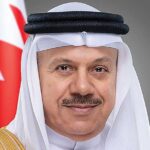DR. ABDULLATIF BIN RASHID AL ZAYANI, MINISTER OF FOREIGN AFFAIRS, BAHRAIN

I am delighted to extend a warm welcome to each and every one of you to this year’s Manama Dialogue, where in these most difficult of regional and international circumstances we reaffirm the practical value and importance of engaging in sincere and meaningful dialogue. By doing so, we are actively seeking solutions to all the issues and challenges that lie before us, to create opportunities for genuine peace, stability and prosperity in the days and years ahead.
The focus of our session is Navigating Global Competition. As regions, the Gulf and Middle East have endured a long and often troubled history, filled with negative repercussions of such competition. Over centuries, nations both within and beyond the Middle East have competed for land, resources and influence using the full range of political, diplomatic, economic and military means. Consequently, the region and its peoples have endured endless conflicts, instability and unimaginable human suffering, thereby depriving them of the opportunity to fully realize their potential.
Today, this competition persists, and if anything, has grown even more complex, more dynamic and more pervasive than ever before. Indeed, it may be hardwired into our human psyche, such that it is a core instinct to engage in competition with others.
The question is how to channel this competition in a constructive manner that fuels innovation, growth and progress. How can we ensure that we do not lag behind while also ensuring that we do not leave others behind? How can we strike a balance between our national interests and our global responsibilities? How can we foster a more inclusive, resilient and peaceful world?
And in the broader international context, we must also ask how, as individual nations and societies, we can steer competition among both regional and global actors towards cooperation rather than conflict.
It is vital that we recognize the immense value and potential that lies in fostering collaborative efforts as opposed to perpetuating a destructive cycle of antagonism.
I believe there are two fundamental preconditions necessary to achieve this objective. First, we need a framework of shared principles and values that can guide the actions of all parties involved. The Kingdom of Bahrain has always believed in the importance of mutual respect, dialogue and tolerance. These values are crucial in navigating global competition and creating peace, stability and prosperity, not only in our region, but also beyond. They not only help us maintain good relations with our neighbors and partners, but also shape our constructive engagement with the wider international community.
Based on these core values, we establish principles like respect for national sovereignty, non-interference in internal affairs and adherence to international law and the United Nations Charter. These values and principles serve as a compass for nations, guiding us through the ever-changing landscape of global competition.
With new actors, alliances and dynamics emerging every day, they provide a stable reference point in times of unprecedented change. From the rise of emerging economies to the rapid spread of digital technologies, and the challenges of globalization and resilience of supply, these values and principles help us navigate such challenges and find common ground.
If we can promote and advocate for these values and principles on a global scale, demonstrating their importance to all states, societies and peoples, I believe that we can redirect competition in a positive direction in our region and beyond. By doing so, we will show that international relations are not a zero-sum game, but an opportunity for cooperation and collaboration leading to mutual benefits and shared solutions.

